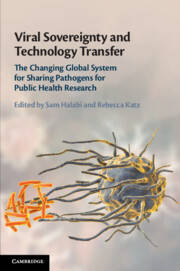 Viral Sovereignty and Technology Transfer
Viral Sovereignty and Technology Transfer Book contents
- Viral Sovereignty and Technology Transfer
- Viral Sovereignty and Technology Transfer
- Copyright page
- Contents
- Maps
- Tables
- Contributors
- Preface
- Acknowledgments
- Introduction Viral Sovereignty, Technology Transfer, and the Changing Global System for Sharing Pathogens for Public Health Research
- Part I The Geopolitical, Historical, and Scientific Context
- Part II Health Security, Research Ethics, and Human Rights Implications
- 4 The Ethics of Conducting Genomic Research in Low-Resource Settings
- 5 The Ethics of Human Pathogen Research during Public Health Emergencies in Low- and Middle-Income Countries
- 6 Biosecurity, Biosafety, and the Management of Dangerous Pathogens for Public Health Research
- 7 Human Rights Implications of Pathogen Sharing and Technology Transfer
- Part III Solutions: Standard Material Transfer Agreements, Repositories, and Specialized International Instruments
- Index
6 - Biosecurity, Biosafety, and the Management of Dangerous Pathogens for Public Health Research
from Part II - Health Security, Research Ethics, and Human Rights Implications
Published online by Cambridge University Press: 15 May 2020
- Viral Sovereignty and Technology Transfer
- Viral Sovereignty and Technology Transfer
- Copyright page
- Contents
- Maps
- Tables
- Contributors
- Preface
- Acknowledgments
- Introduction Viral Sovereignty, Technology Transfer, and the Changing Global System for Sharing Pathogens for Public Health Research
- Part I The Geopolitical, Historical, and Scientific Context
- Part II Health Security, Research Ethics, and Human Rights Implications
- 4 The Ethics of Conducting Genomic Research in Low-Resource Settings
- 5 The Ethics of Human Pathogen Research during Public Health Emergencies in Low- and Middle-Income Countries
- 6 Biosecurity, Biosafety, and the Management of Dangerous Pathogens for Public Health Research
- 7 Human Rights Implications of Pathogen Sharing and Technology Transfer
- Part III Solutions: Standard Material Transfer Agreements, Repositories, and Specialized International Instruments
- Index
Summary
Chapter 6 discusses biosecurity in the transfer of human pathogens. In the aftermath of the 2014–2016 West Africa Ebola outbreak, there were thousands of Ebola samples that went unaccounted for as well as virus samples stored in facilities that did not have an appropriate level of biosecurity and biosafety. The chapter reviews the existing global governance mechanisms for addressing this biosafety and biosecurity concern, and the ongoing debate amongst donor countries as to the best path forward. The chapter describes efforts to support the Government of Sierra Leone to find and secure Ebola samples as foreign labs shut down, identifying the challenges of tracking all Ebola samples and their associated data, and efforts to place those samples in suitable inventoried repositories by local health authorities. The chapter concludes with recommendations for governments around the world to ensure that plans, procedures and regulations are in place prior to the chaos of an emergency in order to ensure that dangerous pathogens are handled in safe and secure manners, that data are preserved for research, and appropriate practices are implemented.
- Type
- Chapter
- Information
- Viral Sovereignty and Technology TransferThe Changing Global System for Sharing Pathogens for Public Health Research, pp. 100 - 119Publisher: Cambridge University PressPrint publication year: 2020
- 1
- Cited by


